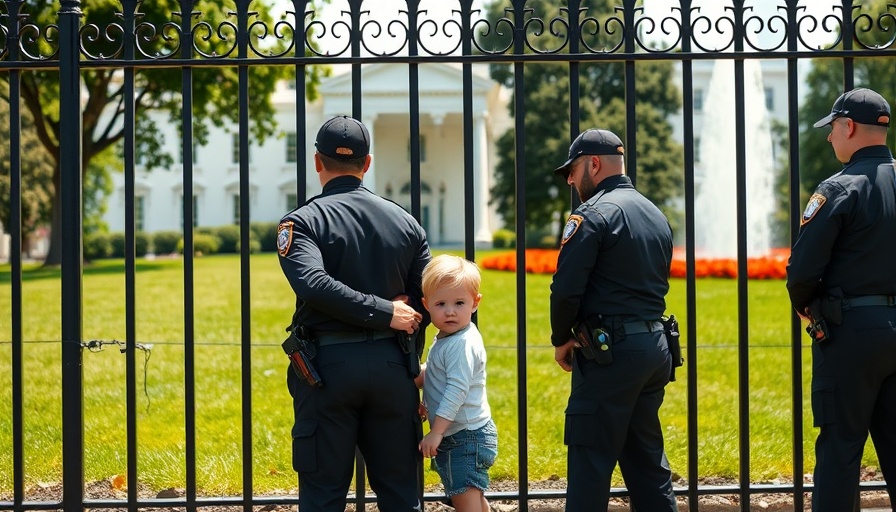
A Curious Incident: Toddler Breaches Security at the White House
In an unexpected turn of events on April 18, 2023, a toddler's innocent curiosity led to a significant moment at one of the most secure locations in the United States. The child crawled through a fence and garnered the immediate attention of the Secret Service, showcasing both the charm of childhood curiosity and the reality of security protocols at the White House. Chief of Communications for the Secret Service, Anthony Guglielmi, quickly addressed the incident, mentioning that the security systems were immediately triggered, bringing officers to the scene to ensure the child’s safety.
Historical Context: Previous Incidents of Intrusions
This is not the first time a young child has found a way through the White House's barriers. A similar incident occurred back in 2014 when a toddler managed to breach the grounds shortly before a scheduled address by then-President Barack Obama. Such occurrences prompt discussions about security measures in place and how they can interact with unexpected innocent breaches.
A Lesson in Security Response
The rapid response by the Secret Service highlights the importance of their role in protecting not only the President but also the integrity of national security. While the incident was light-hearted due to the age of the intruder, it raises valid questions about how such events are managed at a location where security is paramount. “We were going to wait until he learned to talk to question him, but in lieu of that, he got a timeout and was sent on his way with parents,” reflected Edwin Donovan, the former Secret Service spokesperson. This demonstrates how officials balance safety with the light-hearted moments that arise from unusual situations.
Parental Responsibility and Awareness
The incident serves as a reminder for parents to maintain vigilance in public spaces, especially in high-security areas like the White House. Though children are often unpredictable, awareness of surroundings and the inherent risks of letting children explore freely are crucial. Parents should take charge of their child's movements, especially in settings that are crucial to national security.
Future Predictions: Enhancing Security Systems
As extraordinary events like these unfold, one wonders how security personnel can adapt their protocols. Future enhancements to security systems could incorporate advanced detection technologies that can differentiate between potential intruders and innocent children. Such evolutions could minimize the alarm raised by similar innocuous breaches in the future and streamline the response by Secret Service officers.
Public Reactions: Finding Humor in Security
The public often resounds with amusement in light of such incidents, finding humor in the juxtaposition of a toddler's innocent actions against the backdrop of stringent security. Among the memes and jokes about the incident on social media platforms, there's an undercurrent of appreciation for the robustness of the security measures in place. Many take to humor to relieve the tension that often accompanies discussions around national security.
Embracing Human Interest Amidst Protocol
While discussions on security typically spin around the serious and sometimes grim aspects of protective measures, this light moment reminds us of the human element involved in these high-security scenarios. The innocence of a child can temporarily break the stern atmosphere that often envelops official buildings, creating stories that are both endearing and simultaneously a reminder that security is paramount.
Conclusion: More Than Just Security Protocols
Ultimately, the incident involving the toddler is a microcosm of larger societal themes—family, safety, childhood innocence, and the interplay between security and public life. As the nation reflects on this unusual security breach, it becomes essential to balance oversight with understanding, ensuring our spaces remain safe while allowing for the occasional delightful disruption that reminds us of our humanity.
 Add Row
Add Row 
 Add
Add 


 Add Row
Add Row 
 Add
Add
Write A Comment